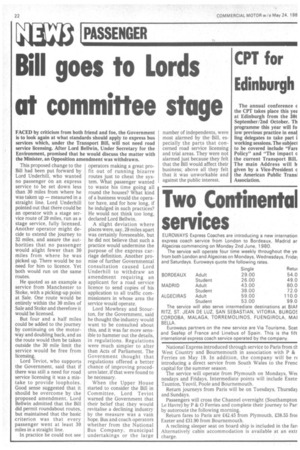Bill goes to Lords at committee stage
Page 24

If you've noticed an error in this article please click here to report it so we can fix it.
FACED by criticism from both friend and foe, the Government is to look again at what standards should apply to express bus services which, under the Transport Bill, will not need road service licensing. After Lord Bellwin, Under Secretary for the Environment, promised that he would discuss the matter with the Minister, an Opposition amendment was withdrawn.
This proposed change to the Bill had been put forward by Lord Underhill, who wanted no passenger On an express service to be set down less than 30 miles from where he was taken up — measured in a straight line. Lord Underhill pointed out that there could be an operator with a stage service route of 29 miles, run as a stage service, fully licensed. Another operator might decide to extend the journey to 32 miles, and assure the authorities that no passenger would alight fewer than 30 miles from where he was picked up. There would be no need for him to licence. Yet both would run on the same routes.
He quoted as an example a service from Manchester to Stoke, with a picking-up point at Sale. One route would be entirely within the 30 miles of Sale and Stoke and therefore it would be licensed.
But four and a half miles could be added to the journey by continuing on the motorway and doubling back, and as the route would then be taken outside the 30 mile limit the service would be free from licensing.
Lord Teviot, who supports the Government, said that if there was still a need for road service licensing it was a mistake to provide loopholes. Good sense suggested that it shotild be overcome by the proposed amendment. Lord Bellwin admitted that the Bill did permit roundabout routes, but maintained that the basic criterion was that every passenger went at least 30 miles in a straight line.
In practice he could not see operators making a great profit out of running bizarre routes just to cheat the system. What passenger wanted to waste his time going all round the houses? What kind of a business would the operator have, and for how long, if he indulged in such practices? He would not think too long, declared Lord Bellwin.
A slight deviation where places were, say, 29 miles apart was certainly foreseeable, but he did not believe that such a practice would undermine the purpose of the express carriage definition. Another promise of further Governmental consultation caused Lord Underhill to withdraw an amendment requiring an applicant for a road service licence to send copies of his application to all traffic commissioners in whose area the service would operate.
Lord Mowbray and Stourton, for the Government, said he thought the industry would want to be consulted about this, and it was far more sensible to hammer out the details, in regulations. Regulations were much simpler to alter than Acts of Parliament. The Government thought that regulations offered a better chance of improving procedures later, if that were found to be necessary.
When the Upper House started to consider the Bill in Committee, Lord Teviot warned the Government that their belief that they would revitalise a declining industry by the measure was a vain hope. Bus and coach operators whether from the National Bus Company, municipal undertakings or the large number of independents, were most alarmed by the Bill, especially the parts that concerned road service licensing and trial areas. They were not alarmed just because they felt that the Bill would affect their business; above all they felt that it was unworkable and against the public interest.
































































































































